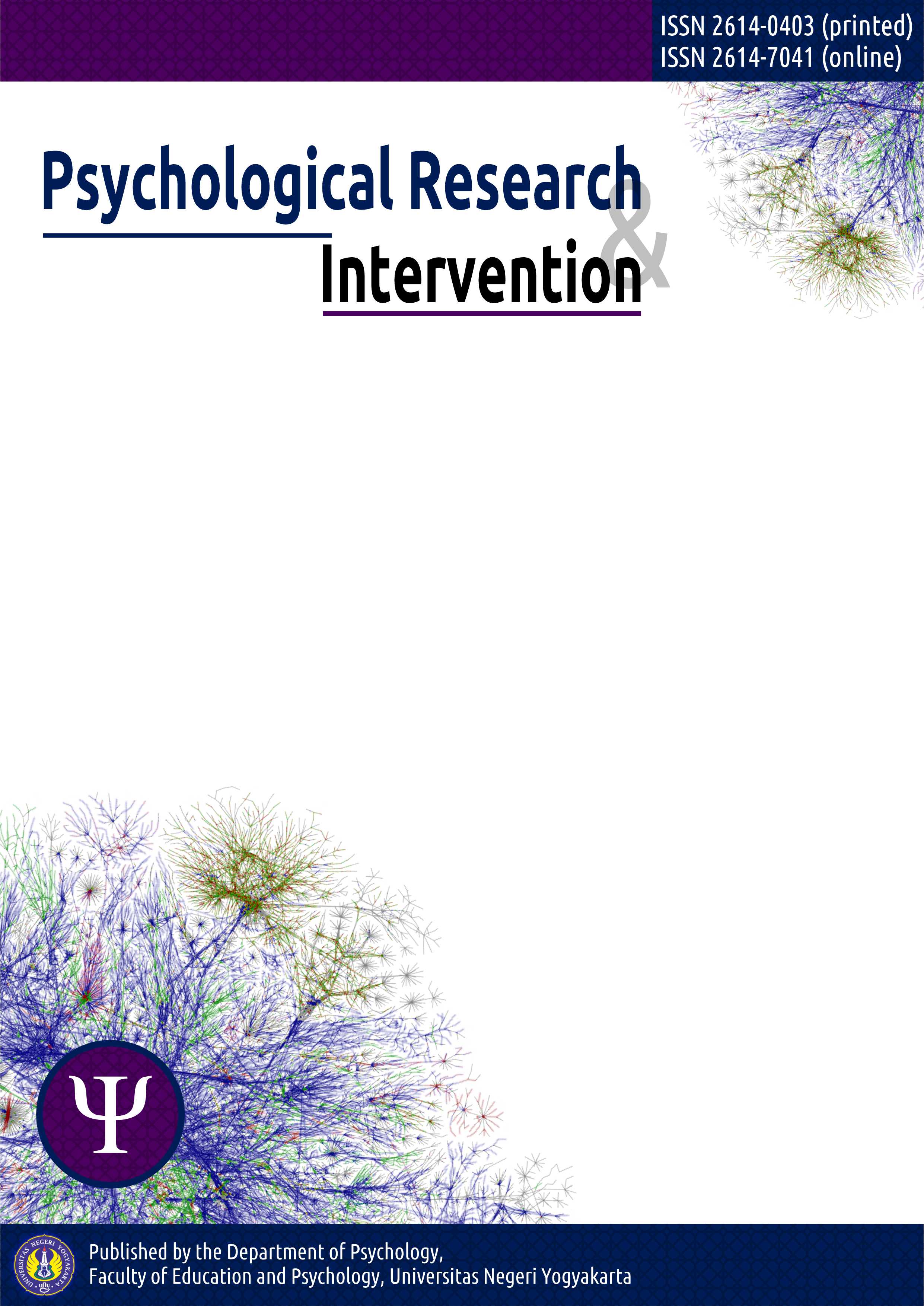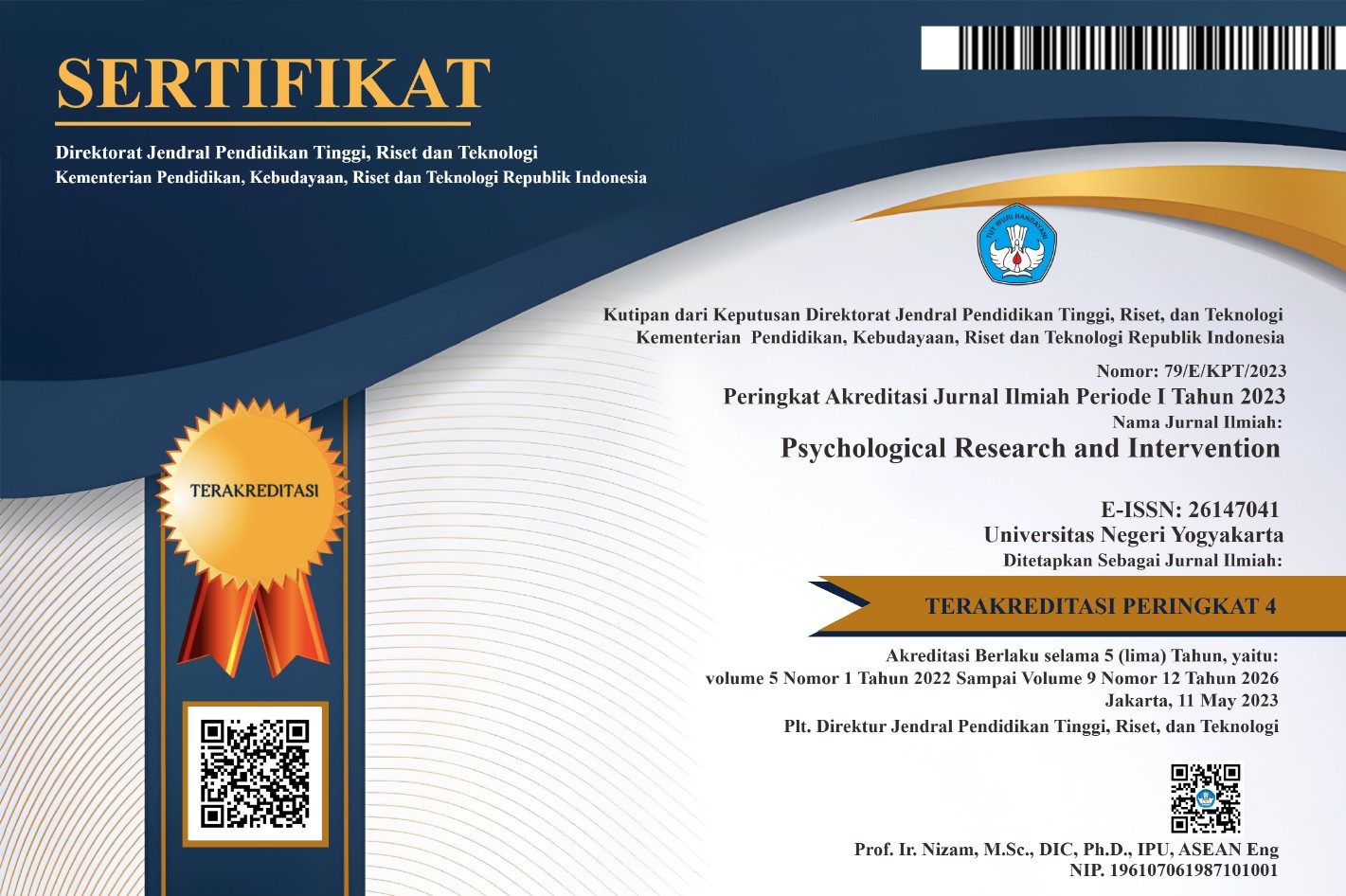Loneliness and Psychological Well Being on International Students of The Darmasiswa Program at Universitas Negeri Yogyakarta
DOI:
https://doi.org/10.21831/pri.v2i2.30326Keywords:
loneliness, psychological well being, international studentsAbstract
This research aims to describe and find out the correlation between loneliness and the psychological well-being of international students of the Darmasiswa program at Yogyakarta State University. This research uses descriptive quantitative methods and data sources are obtained based on instruments that are distributed to 20 research subjects the international students. The research data were collected with the UCLA Loneliness Scale and Psychological Well Being Scale instruments which were then analyzed using SPSS 22.0 with the Pearson Product Moment correlation test. The results showed that there was a very weak negative relationship (r=-0.152) between loneliness and the psychological well-being of Darmasiswa students at Yogyakarta State University. Most research subjects have low levels of loneliness and moderate psychological well-being. There are two dimensions of psychological well-being that have the highest relationship with loneliness, namely environmental mastery (-0,338) and positive relationships with others (-0,299).
References
Aisah, A. dkk. (2017). Well-Being Mahasiswa (Studi Kuantitatif Deskriptif di Universitas Muhammadiyah Yogyakarta). Yogyakarta: Universitas Muhammadiyah Yogyakarta.
Aldawsari, N. dkk. (2018). The Effect of Cross Cultural Competence and Social Support on International Students' Psychological Adjustment: Autonomy and Environmental Mastery. Journal of International Student. Vol. 8 No. 2.
Arikunto, S. (2010). Prosedur Penelitian Suatu Pendekatan Praktik. Jakarta: Rineka Cipta.
Azwar, S. (2015). Penyusunan Skala Psikologi Edisi 2. Yogyakarta: Pustaka Pelajar.
Baron, R.A, & Byrne, D. (1997). Social Psychology, eight editions. Massachusettes: Allyn and Bacon.
Baron, R.A, & Byrne, D. (2000). Psikologi Sosial. ----
Brehm, S. S, & Kassin, S. M. (1990). Social Psychology. Boston: Houghton Mifflin.
Bruno, F. J. (2000). Conquer Loneliness: menaklukkan kesepian. Jakarta: PT Gramedia Pustaka Utama.
Cecen, R & Cenkseven, F. (2007). Psychological Well Being in Predicting Loneliness among University Students. C.U. Journal of Institute of Social Scieces. Vol. 16 No. 2.
Chaplin, J. P. (2011). Kamus Lengkap Psikologi. Jakarta: PT Raja Grafindo Persada.
De Lazzari, S. (2000). Emotional Intelligence, Meaning, and Psychological Well Being: A Comparison Between Early ang Late Adolescence. British Columbia: Trinity Western University.
Depdikbud. (2012). Undang-Undang RI Nomor 12, Tahun 2012, tentang Pendidikan Tinggi.
Halim, C. F. & Dariyo, A. (2016). Hubungan Psychological Well Being dengan Loneliness pada Mahasiswa yang Merantau. Jurnal Psikogenesis Fakultas Psikologi Universitas Yasri. Vol. 4 No. 2.
Hurlock, E. B. (1980). Psikologi Perkembangan Suatu Pendekatan Sepanjang Rentang Kehidupan. Jakarta: Erlangga.
Kashdan, T. B. (2009). Origins of Purpose in Life: Refining our Understanding of a Life Well Lived. Journal Psihologijske Teme. Vol. 18 No. 2.
Kamus Besar Bahasa Indonesia.
Liwarti, L. (2013). Hubungan pengalaman spiritual dengan psychological well-being pada penghuni lembaga permasyarakatan. Jurnal Sains dan Praktik Psikologi UMM. Vol. 1 No. 1.
Myers, David G. (1999). Psikologi Sosial. Jakarta: Salemba Humanika.
Neugarten, L. B. (1961). Life satisfaction and social interaction in the aging. Journal of Georntology. Vol. 16.
Prasetia, Dwi Nur. (2013). Hubungan Antara Kesepian dengan Penyesuaian Diri pada Mahasiswa (studi Korelasi pada Mahasiswa Tahun Pertama Fakultas Psikologi Universitas Diponegoro). Semarang: Universitas Diponegoro.
Rahayu, M. A. (2008). Psychological Well Being pada istri kedua dalam pernikahan poligami (studi kasus pada dewasa muda). Depok: Universitas Indonesia.
Reken, G. & Wong, P. T. (1987). Meaning and Purpose in Life and Well-Being: a Life-span Perspective. Journal of Gerontology. Vol. 42.
Russell, D. (1996). UCLA Loneliness Scale (Version 3): Reliability, Validity, and Factor Structure. Journal of Personality Assessment. Vol. 66.
Russell, D. dkk. (1980). The Revised UCLA Loneliness Scale: Concurrent and Discriminant validity evidence. Journal of Personality and Social Psychology. Vol. 39.
Ryff, C. D. (1989). Happiness is everything, or is it? Explorations on the meaning of psychological well-being. Journal of Personality and Social Psychology. Vol 56.
Sarwono, J. (2009). Statistik itu mudah: panduan lengkap untuk belajar komputasi statistik menggunakan SPSS 16. Yogyakarta: Andi offset.
Sjostorm, O. (2002). Validity of a questionnaire survey: response patterns in deifferent subgroups and the effect of social desirability. Journal: Acta Odontologica Scandinavica. Vol. 60.
Sudjana, N. & Ibrahim. (1989). Penelitian Kualitatif dan Kuantitatif. Bandung: Sinar Baru.
Sugiyono. (2011). Metode Penelitian Kuantitatif, Kualitatif, dan R & D. Bandung: Alfabeta.
Ulfah, Dina Maria. (2012). Hubungan antara Penerimaan Diri dengan Persepsi Terhadap Kesepian pada Remaja yang tinggal di Panti Asuhan Darul Aitam Wadlufa'Lasem. Semarang: Universitas Sultan Agung.
Wardani, W. K. (2016). Daya Juang Mahasiswa Asing. Jurnal Ilmiah Psikologi: PSYMPHATIC. Vol. 3 No. 2.
Weiss, R. S. (1973). Loneliness: The experience of emotional and social isolation. Cambridge, MA: MIT Press.
Wheeler, L. & Reis, H. (1983). Loneliness, social interaction, and sex roles. Journal of Personality and Social Psychology. Vol. 45.
Wijaya, R. (2013). Anxiety Uncertainty Management Mahasiswi Inholland Program Studi Manajemen Bisnis Internasional. Jurnal E-Komunikasi. Vol. 1 No. 1.












